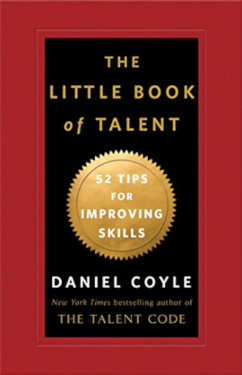Rob Rashell Golf

The Little Book of Talent: 52 Tips For Improving Your Skills
By Daniel Coyle, Published 2012
The Little Book of Talent Amazon Page
A supplement to The Talent Code and an awesome book on understaning the process of getting better at almost anything. Resonates with my experience as a professional golfer, learning to love practice, how to practice and why it matters.
Added April 2020
Notes
My notes are excerpts from the book that caught my eye, stood out to me.
Why the brain? Because developing talent is all about growing the brain. “Muscle memory” doesn’t really exist, because our muscles simply do what our brains tell them to do. Thus, the new science can be summed up as follows: You want to develop your talent? Build a better brain through intensive practice.
One of the keys to igniting your motivation is to fill your windshield with vivid images of your future self, and to stare at them every day.
All improvement is about absorbing and applying new information, and the best source of information is top performers. So steal it.
A high percentage of top performers keeps some form of daily performance journal.
What matters is that you write stuff down and reflect on it . Results from today . Ideas for tomorrow . Goals for next week. A notebook works like a map: It creates clarity.
The point of this super-exaggerated slowness (which produces songs that resemble those of humpback whales) is to reveal small mistakes that might have gone undetected, and thus create more high - quality reaches.
Simple, humble spaces help focus attention on the deep - practice task at hand:
To develop reliable hard skills, you need to connect the right wires in your brain.
Learning fundamentals only seems boring — in fact, it’s the key moment of investment. If you build the right pathway now, you’ll save yourself a lot of time and trouble down the line.
You might be surprised to learn that many top performers place great importance on practicing the same skills they practiced as beginners.
“One of the most unfortunate things I see when identifying youth players is the girl who is told over the years how great she is. By the time she’s a high school freshman, she starts to believe it. By her senior year, she’s fizzled out. Then there’s her counterpart: a girl waiting in the wings, who quietly and with determination decides she’s going to make something of herself. Invariably, this humble, hardworking girl is the one who becomes the real player.”
If you have early success, do your best to ignore the praise and keep pushing yourself to the edges of your ability, where improvement happens.
People in the hotbeds have a different relationship with practicing.
But in the talent hotbeds I visited, practice was the big game, the center of their world, the main focus of their daily lives.
Deep practice has a telltale emotional flavor, a feeling that can be summed up in one word: “struggle.”
The world-class performers spent five times as many hours practicing alone.
“The vision of a champion is someone who is bent over, drenched in sweat, at the point of exhaustion, when no one else is watching.”
Develop the habit of attending to your errors right away. Don’t wince, don’t close your eyes; look straight at them and see what really happened, and ask yourself what you can do next to improve. Take mistakes seriously, but never personally.
We trade precision — and long - term performance — for a temporary thrill. So, slow it down.
One of the most fulfilling moments of a practice session is when you have your first perfect rep.
The point is to mark this moment — this is the spot where you want to go again and again.
“Practice begins when you get it right.”
Napping is common in talent hotbeds, and features both anecdotal and scientific justification.
“You need sleep before learning, to prepare your brain, like a dry sponge, to absorb new information, ”said the study’s lead investigator, Dr. Matthew Walker.
Just before falling asleep, they play a movie of their idealized performance in their heads.
I started focusing on delivering short, targeted, customized messages to each player, one at a time.
Their mind-set is not entitled or arrogant; it’s 100 - percent blue collar: They get up in the morning and go to work every day, whether they feel like it or not.
Games encourage players, coaches, and parents to judge success by the scoreboard rather than by how much was learned.
Grit is that mix of passion, perseverance, and self-discipline that keeps us moving forward in spite of obstacles.
Keeping our big goals to ourselves is one of the smartest goals we can set.